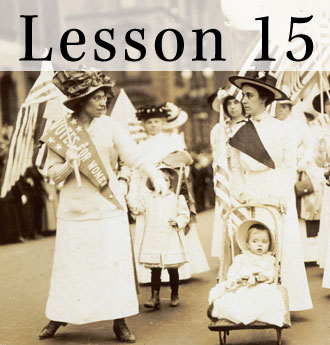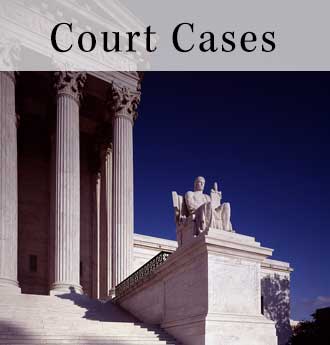Lesson 15: How Have Amendments and Judicial Review Changed the Constitution?
Hamilton, Alexander (1755-1804) Hamilton was a senior aide-de-camp to General Washington and an artillery captain during the Revolutionary War. He was a delegate from New York to the Philadelphia Convention and one of three authors of The Federalist, written to urge ratification of the U.S. Constitution. He later served as the first secretary of the treasury, put the nation's finances on a firm footing and advocated a strong national government.
Jackson, Andrew (1767-1845) Jackson was the seventh president of the United States. He was a general and hero of the War of 1812. Jackson served in the House and Senate. He had frontier origins and was seen as representative of the growing democratic spirit in the South and West. Jackson was elected president in 1828 and reelected in 1832.
Jefferson, Thomas (1743-1826) Thomas Jefferson was the third president of the United States. He was a scientist, philosopher, diplomat, and architect. He supported the revolutionary cause and served as governor of Virginia. Between June 11 and June 28, 1776, Jefferson wrote the initial draft of the Declaration of Independence, which was amended by John Adams and Benjamin Franklin and submitted to Congress. Jefferson supported the Constitution but was critical of its lack of a bill of rights. He was the first secretary of state in Washington's cabinet and the leader of the Republican Party. Jefferson was elected vice president in 1796 and was chosen president four years later. He was reelected to the presidency in 1804.
Madison, James (1751-1836) The "Father of the Constitution" was born to a wealthy Virginia family. He was taught at home and in private schools, then graduated from the College of New Jersey. While deciding whether to become a lawyer or minister, Madison became involved in the revolutionary cause, thereby entering state and local politics. His poor health kept him from serving in the military. In 1780, Madison was chosen to serve in the Continental Congress, where he played a major role. He was one of the most influential voices calling for a constitutional convention. He came to the Philadelphia Convention with a plan for the new government, took extensive notes on the proceedings, spoke more than 150 times, and worked tirelessly on various committees. As one of the authors of The Federalist, Madison was also a key figure in the battle for ratification. Following the convention, Madison served as a member of the U.S. House of Representatives, helping to frame the Bill of Rights and organize the executive department. Under Jefferson, Madison served as secretary of state. He then succeeded Jefferson as president. In retirement, Madison continued to speak out on public issues.
Marshall, John (1755-1835) Chief justice of the United States from 1801 to 1835. Supported ratification of the Constitution and led Federalist Party in Virginia. Member of the House of Representatives. Served 34 years as chief justice, interpreting the Constitution in a manner that reflected his belief in a strong and effective national government.
Mason, George (1725-1792) George Mason wrote the Virginia Declaration of Rights. Later, as a delegate to the Philadelphia Convention (see Lessons 9-12) Mason led the movement against ratification of the U.S. Constitution because it lacked a bill of rights (see Lesson 13). Mason did not want government in America to become like government in England, and he believed declarations of rights as limits on government were one way to prevent this.
Pinckney, Charles (1757-1824) Charles Pinckney was born in South Carolina, the son of a rich lawyer and planter. He trained as a lawyer. He served in the militia during the Revolution, was captured by the British, and remained a prisoner until 1781. He served in the Continental Congress and the South Carolina legislature. At the Philadelphia Convention, Pinckney spoke often. He was a good speaker who contributed to the compromises that made the Constitution possible. After the convention, he held a variety of political offices, including governor and U.S. senator. Although he began his career as a Federalist, he switched to the Republican party and worked to give the vote to all white males. The last public office he held was a seat in the U.S. House of Representatives.
Roosevelt, Franklin D. (1882-1945) Thirty-second president of the United States, the only person to be elected to the office four times. He served during the Great Depression of the 1930s and World War II.
Sherman, Roger (1721-1793) Born in 1721 in Massachusetts, Sherman spent most of his boyhood helping his father with farming and shoe-making chores. However, he read in whatever spare time he could find. In 1743, he moved to Connecticut, purchasing a store and winning a variety of local political offices. Although Sherman had not formally studied the law, he became a lawyer. His career was distinguished, including service in the state legislature, and work as a judge. Although he gave up the practice of law in 1761, he continued his political career, serving in the Continental Congress. Sherman was one of the members of the committee that drafted the Declaration of Independence and the Articles of Confederation. He attended nearly every session of the Philadelphia Convention and was an important contributor to the Great Compromise. He also worked hard to get Connecticut to ratify the Constitution. Sherman later served as a member of the House of Representatives and the Senate.








